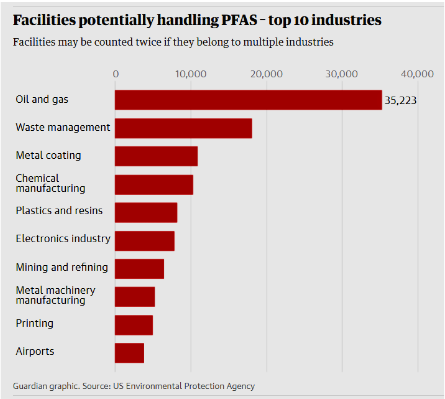
Ever wonder why resource rape & pillage Caveman Canada has no EPA?
Any authority investigating PFAS pollution in Canadian waters and bodies (human and otherwise)?

The webinar features presentations by:
Dusty Horwitt, J.D., author of Physicians for Social Responsibility’s report Fracking with “Forever Chemicals,” and
Katherine Pelch, Ph.D., environmental health science and policy analyst and assistant professor at the University of North Texas Health Science Center.
View the recording at link:
PFAS, Endocrine Disruption, and Shale Gas Development on Vimeo by EHP and Halt the Harm, Sept 21, 2021
Environmental Health Project and Halt the Harm Network partnered in September 2021 to host this new webinar on PFAS, endocrine disruption, and shale gas development.
Per- and polyfluoroalkyl substances (PFAS), also known as “forever chemicals,” are widely used in many consumer products and industrial applications. Because of their chemical structure, these substances do not break down, which results in their accumulation in the environment and in the body. Health impacts associated with exposure to PFAS are many and varied.
During the webinar, Dusty Horwitt, J.D., the author of PSR’s recently released report Fracking with “Forever Chemicals,” discussed the evidence of PFAS within oil and gas operations, the problems with a lack of transparency, and the regulations needed to better protect public health.
In addition, Katherine Pelch, Ph.D., environmental health science and policy analyst and assistant professor at the University of North Texas Health Science Center, discussed the health impacts of PFAS, focusing specifically on endocrine disruption. Dr. Pelch also discussed the PFAS-TOX Database and regulation and exposure mitigation.
The webinar was moderated by Makenzie White, MPH, LSW, Public Health Manager at EHP.
About the Presenters
Dusty Horwitt, J.D. has spent 15 years researching and working to protect communities from the health and environmental impacts of oil and gas drilling and fracking. An attorney and former reporter, he has written a chapter on fracking chemical disclosure for a textbook published by Elsevier. He has also been quoted and his work has been featured in media outlets including the New York Times, Pittsburgh Post-Gazette, Wall Street Journal, and Marketplace on NPR. He has played significant roles in efforts to protect New York State, the George Washington National Forest, and the Delaware River Basin from unsafe shale gas drilling and fracking. He is currently a consultant with Physicians for Social Responsibility and authored a report on the use of PFAS in oil and gas extraction published by PSR in July 2021.
Dr. Katie Pelch, PhD. is an environmental health science and policy analyst and assistant professor at the University of North Texas Health Science Center. Working with NGOs, state agencies, and pollution-impacted communities, Dr. Pelch works to improve human health by reducing human and environmental exposure to chemicals that interfere with healthy hormone function. Dr. Pelch’s research focuses on data synthesis methods to catalog the existing health and toxicological literature for classes of chemicals such as bisphenols and PFAS. The results of these efforts inform risk assessment and policy decisions. Dr. Pelch has been particularly engaged in ongoing activities to regulate PFAS in drinking water across the US.
Makenzie White, MPH, LSW received her MSW and MPH from the University of Pittsburgh. She was the former program director of Oakland Residential for the Community Human Services Corp, which empowers individuals and families to live in stable housing, connect with community resources, build relationships, and access quality food. Ms. White volunteers as the president of the Pittsburgh chapter of Engineers Without Borders, where she brings a much-needed public health perspective to engineering projects in developing countries.



